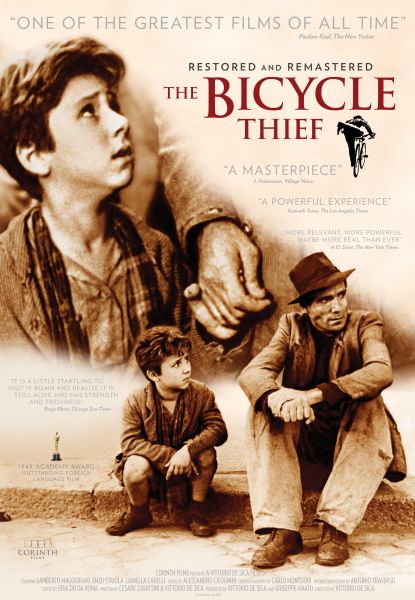Bicycle Thieves

Description:
Set in postwar Rome, Bicycle Thieves tells of Antonio Ricci, an impoverished man who finally lands a job delivering goods on a bicycle, only to have it stolen on his first day. With his young son Bruno, he searches the city, facing hunger, humiliation, and a harsh, indifferent world. Through such hardship, the film crafts a quiet, devastating portrait of perseverance, dignity, and the fragility of family in a ruined society.Keywords:
Everyday Life, Drama, Neorealism, Postwar Italy, Italian CinemaWhat is the point of the movie Bicycle Thieves?
"Bicycle Thieves," directed by Vittorio De Sica, is a poignant exploration of post-World War II Italy's struggles with poverty and despair. The film follows Antonio Ricci, who desperately needs a bicycle for work to support his family. When his bike is stolen, he embarks on a desperate search through Rome with his young son. The movie highlights themes of desperation, father-son relationships, and the societal impacts of economic hardship. Ultimately, it critiques the indifference of society to individual suffering, showcasing the fragility of human dignity in dire circumstances.
Why were Bicycle Thieves banned?
"Bicycle Thieves," directed by Vittorio De Sica, has not been officially banned in most places; however, it faced censorship in some countries shortly after its release in 1948 due to its portrayal of poverty and social issues. The film's stark realism and critical perspective on post-war Italy challenged prevailing narratives and could be seen as politically sensitive. Over time, it has gained recognition as a classic of Italian neorealism and is celebrated for its poignant storytelling and humanistic themes.
Is Bicycle Thieves worth watching?
Yes, "Bicycle Thieves" (original title: "Ladri di biciclette") is definitely worth watching. Directed by Vittorio De Sica in 1948, it's a seminal work of Italian neorealism that tells the poignant story of a father and son searching for a stolen bicycle essential for the father's job. The film explores themes of poverty, desperation, and the human condition with powerful performances and a realistic portrayal of post-war Italy. Its emotional depth and social commentary have made it a classic in cinema history.
How does the movie Bicycle Thieves end?
"Bicycle Thieves" ends on a poignant note as Antonio, the protagonist, is unable to find his stolen bicycle, which he desperately needs for his job. In a moment of desperation, he tries to steal a bicycle himself but is caught. Instead of facing the shame of being a thief, he walks away with his son, Bruno, who has witnessed the entire ordeal. The film concludes with the father and son walking hand in hand, symbolizing their bond despite their struggles, highlighting themes of poverty, desperation, and the human condition.
Explore More Categories:
Terrorism Cybercrime Adaptation Natural Disasters Rock Climbing Feminine Undead Cult Following Slapstick British Culture Memories Psychological Tension Surgical Drama Improvisation Hijacking Refugee Music Industry Rave Environmental Christmas Whimsical Mentorship Ocean Gangster Contemporary Relationships